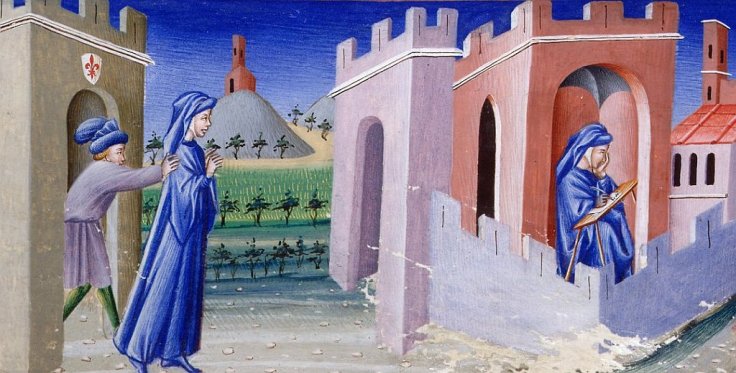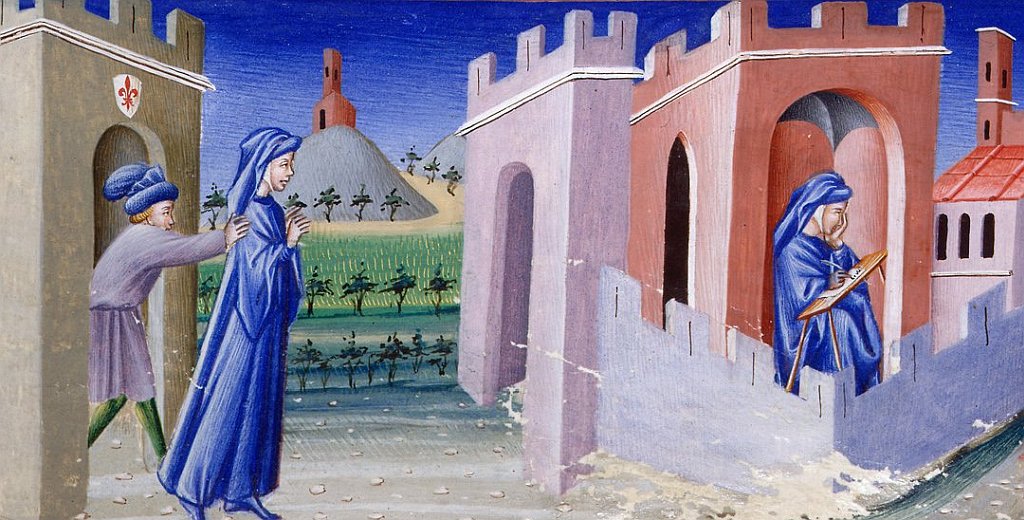
Dante’s Divine Comedy tracks his journey from hell to heaven – but Dante has now arrived at a new destination in Durham, partly through a forthcoming exhibition at Palace Green Library, and also through a Durham Book Festival event on Discovering Dante, which explored the poet’s enduring influence on today’s art, literature, and culture around the world. Aalia Ahmed travelled along.
Opening the discussion, Professor Annalisa Cipollone questions: ‘Why is Dante still important today?’ He was a Florentine poet born in the mid-thirteenth century yet he still seems to fascinate and awe readers and listeners in the present day through his vivid word-paintings of Hell, Purgatory, and Paradise in The Divine Comedy. She invites the audience to ponder the complexities of the characters in the poem as, she tells us, the people met by the protagonist on his journey are not merely fictional metaphorical devices; they are real human beings, historical figures, and people Dante possibly knew and met himself, with real stories to tell. These figures, especially those sentenced to life in Hell, made their own choices which led to such a horrific fate and this, in turn, causes the audience to question their own decisions. Therefore, Professor Cipollone suggests, the epic poem is about second chances as even the damned lost souls in Hell are given the opportunity to speak out beyond the grave.

Alongside Professor Cipollone are Professor Michael O’Neill, Professor Jason Harding, and Professor Nicola Gardini. Professor O’Neill begins his discussion with a reading of Canto 21 where the Roman poet Statius is met by Dante and Virgil. This, remarks Professor O’Neill, is a fine example of the three poets engaging in intertextual dialogue with a touching account of Statius’s personal experiences being illustrated. Professor O’Neill proceeds to mention the female voices in the poem, the most infamous being that of Francesca da Rimini, the daughter of Guido da Polenta, lord of Ravenna (Francesca and Paolo are the pair of ill-starred lovers Dante meets in Canto 5). The analysis of the meeting between Dante and the lovers ends with the infamous final lines translated into English: ‘And he falls, even as a dead body falls.’
Interestingly, this line provides some inspiration for Professor O’Neill’s own poem, ‘Fall’, that borrows some phrases from his translation of Dante’s poem. The audience is invited to listen a reading of ‘Fall’, which imagines an interview being conducted with the character of Francesca, along with a reading of another of his poems titled ‘Waiting’. This poem is a response to the movement from Dante’s torturous Hell (specifically the scene of entrapped heads in the floor of ice) to Purgatory and a dawning of light and hope.
Michael O’Neill continues with a brief talk about how the Romantic poet Percy Bysshe Shelley responds to Dante, which anticipates how many twentieth-century readers of Dante have responded too. Dante pervades Shelley’s later works (see Prometheus Unbound and Adonais) which are steeped in Dante-esque imagery (ashes, sparks and fire), with ‘The Triumph of Life’ and ‘Ode to the West Wind’ borrowing Dante’s terza rima. Even though Shelley was not a Christian believer like his predecessor, he was compelled to imagine a world beyond this world. He saw Dante as a religious reformer and saw him in modern terms primarily as an imaginative poet. Professor O’Neill closes by reflecting upon how these poems still speak to us and have meaning for us even though their underlying belief system is something people often don’t subscribe to today. It seems that Shelley, too, was very interested in this and suggests the belief system is a scaffolding that can be rejected.
From Shelley, we turn to the comments of Professor Harding in regards to the response of T. S. Eliot to the Florentine Dante. He opens his talk by referencing Eliot’s bold and audacious claim: ‘Dante and Shakespeare divide the modern world between them; there is no third’. According to Professor Harding, Dante’s importance for Eliot is three-fold. Firstly, the Divine Comedy had a great influence on Eliot’s poetry throughout his own career as he constantly references the epic poem (there are parallels between the ideas of a waste land, domestic violence, and apocalyptic images). Secondly, Eliot sees Dante as the master of artistic craft, he is the model poet for poets of all ages. Eliot admires Dante’s conception of austere and visually striking language of which there is no need for embellishment. Finally, the socio-political context of the works depicts Dante as the supreme example of unity of European culture. Professor Harding ends his talk by referencing the complexities of translation. He reflects on Eliot’s attempts to address the challenges of how one translates this great poem into English and how, above all, he admired Shelley’s translation.
Discovering Dante concludes with Professor Gardini’s remarks on how reading affects life and how reading is time. He reminds the audience that all characters are dead except one, the pilgrim Dante. He also points out that, in Dante’s Purgatory, ancients and moderns share the same temporal and spatial dimensions. There is an enduring simultaneity where all human beings are contemporaries and companions: Beatrice sits close to Rachel (one of the wives of the Biblical Jacob); Francesca da Rimini and Dido belong in the same group of sinners; and many philosophers and writers also share the same space and time. Of course, there are many more examples of a conflation of such simultaneity. Professor Gardini shares an interesting analysis of how Dante’s limbo becomes a literary space, a living library of contemporary classics where famous characters and writers gather to become contemporaries. However, the interconnection between past and present is certainly not only for the damned but for the entirety of the poem. Past and present are in a constant dialogue with each other therefore the life of a reader in the present is a re-enactment of a past life in a book. Professor Gardini ends his talk with the claim that we, the readers, become contemporaries of Dante’s Divine Comedy.
The exhibition Hell, Heaven and Hope: A Journey through life and the afterlife with Dante will be on display at Durham’s Palace Green Library from 2nd December 2017 to 18th March 2018. The exhibition follows the story of Dante’s The Divine Comedy, bringing it to life through Durham University’s collections, displayed alongside books and manuscripts from the internationally-renowned collections of Mr Livio Ambrogio, on show in Durham for the first time.





